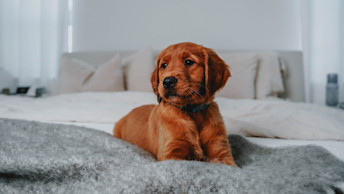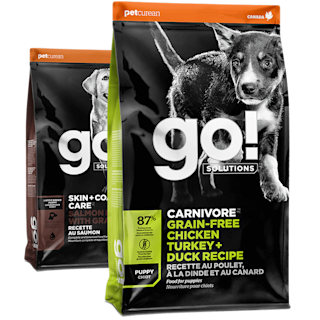June 27, 2024
Mastering the Perfect Puppy Schedule

Bringing home a new puppy is exciting and filled with adorable moments. But it can also feel overwhelming at times. Keeping your pup on a schedule is key to making the puppy period easier for both of you. Let's walk through why a puppy schedule is so important and how to set one up.
Puppies require a lot of attention and supervision. If you’re considering getting a puppy, make sure your lifestyle can accommodate frequent feeding, potty breaks, and time for play and training.
Consistency is a Puppy's Best Friend
Everything is new and confusing for your puppy. Having a predictable routine provides much-needed comfort and security during this transition.
Following a schedule helps your pup:
- Learn potty training more quickly by going out at regular intervals
- Adjust to their crate as a cozy den rather than a scary space
- Stay calm by having their needs met on a cycle they can recognize
- Bond with you through quality play and training sessions
When you provide structure, your puppy feels safe to focus on all the learning ahead. That makes training and development easier for both of you!
The Essentials of a Puppy Schedule
Every effective schedule covers the core needs of a growing pup: potty time, meals, play, training, and rest. Here's how to set up a routine that supports your puppy's development.
Puppy Potty Training Schedule Made Simple
Frequent potty breaks are crucial in the beginning. Take your pup out first thing in the morning, after naptimes, playing, after meals or water breaks, and at least every 2 hours in between2. Stick to this schedule diligently and your puppy will start holding it longer.
Never scold or punish them for indoor accidents. Stay positive and be consistent about taking them out according to the schedule.
With time and consistency, they'll learn that outdoors is the right place to go. Make sure you supervise your pup to catch any accidents. Watch for signs like barking, scratching at the door, sniffing the ground, or circling2 and try to move them outside before they go.
Puppy Crate Training Schedule for Safety and Sanity
Crate training is an effective way to potty train puppies and prevent destructive behaviors when you can't supervise them. Introduce the crate slowly so your puppy can get comfortable with it.
Tips to create positive associations:
- Place blankets and some toys inside to make it cozy
- Provide treats when crating and leaving your puppy to create a positive association
- Give your puppy a food puzzle toy to keep them occupied
- You might even consider feeding your puppy its meals in the crate, to further create positive associations
Use the crate during nap times and don't let your puppy out until they wake up calmly. This prevents accidents from occurring inside. Take your puppy outside immediately after naps.
Keep the crate within earshot in your room at first. Young puppies may be scared and will have to take frequent bathroom breaks during the night4. If your puppy is crying and restless, and it’s been a few hours since their last potty break, take them outside to use the restroom4. Try to schedule nighttime bathroom breaks by setting an alarm so you’re not responding to crying5. Most puppies will be able to sleep through the night after 16 weeks1.
With consistency, your puppy will get used to the crate training schedule and see it as their den space. Be patient - crate training takes time but is worthwhile for housebreaking and your pup's safety when unsupervised.
Puppy Feeding Schedule
Puppies have tiny tummies and big energy needs. Feed 3-4 scheduled meals a day rather than free-feeding. Use proper portion sizes and adjust as needed to maintain a healthy weight. Make sure you’re feeding food formulated for puppies or all life stages to support their growth and development.

Recommended Solution
Expert-Formulated Kibble for Growing Puppies
Formulated by pet nutrition experts to support your puppy’s healthy development. Made with quality animal proteins to support growing muscles, and probiotics to help promote healthy digestion.
View puppy food
Around 6-12 months, depending on your dog’s breed size, you can transition to just 2 meals daily3 while still keeping a consistent schedule. If you need help transitioning your puppy’s food, contact our Customer Care team for personalized advice.

Time for Play and Training
Your puppy has a ton of energy to burn off. Incorporate several short, 10-15 minute play sessions throughout the day using interactive toys. This prevents overstimulation while strengthening your bond. Training sessions should be just as short but frequent to hold your pup's focus. Positive reinforcement keeps them confident and motivated to learn.
Zzzzz...The Importance of Nap Time
Depending on their age, puppies require 12-20 hours of sleep per day for proper growth4. An overtired pup is a cranky, difficult-to-train pup. Crate naptimes, reinforce potty training and ensure your fur baby gets the rest they need.
Following a routine with the same evening crate and wake up times helps your puppy understand when it's bedtime. Align this with their scheduled feeding and potty times for best results.
Your Puppy's Schedule Starts Here
Ready to set up the ideal schedule for your new fur kid? Here's a sample for an 8-week-old pup to get you started:
7:00 am: Wake up & potty break
7:30 am: Breakfast
7:45 am: After meal potty break
8:00 am: Bonding playtime
9:00 am: Potty break
9:15 am: Naptime
10:15 am: After nap potty break
10:30 am: Short training session
11:00 am: Naptime
12:00 pm: After nap potty break
12:15 pm: Lunchtime
12:30 pm: After meal potty break
1:00 pm: Bonding playtime
2:00 pm: Potty break
2:15 pm: Naptime
3:15 pm: After nap potty break
3:30 pm: Short training session
4:00 pm: Naptime
5:00 pm: After nap potty break
5:15 pm: Dinner
5:30 pm: After dinner potty break
6:00 pm: Bonding playtime
7:00 pm: Potty break
7:15 pm: Naptime
8:15 pm: After nap potty break
8:30 pm: Playtime
9:15 pm: Last potty break before bed
9:30 pm: Bedtime
Overnight: Time potty breaks according to your puppy’s age and bladder control. A popular guide is one hour per your puppy’s age in months2. Therefore, if your puppy is two months old, they can hold it for about two hours.
Of course, every puppy is unique! Monitor your pup closely and make adjustments as needed, like more frequent potty breaks. The key is sticking to a predictable routine. With time and consistency, your puppy will settle into their new schedule.
"How to Help Your Puppy Sleep Through the Night." Preventive Vet. Accessed May 22, 2024. https://www.preventivevet.com/dogs/how-to-help-puppy-sleep-through-the-night.
"How to Potty Train Your Dog or Puppy." Humane Society. Accessed May 22, 2024. https://www.humanesociety.org/resources/how-potty-train-your-dog-or-puppy.
"Puppy Feeding Fundamentals." American Kennel Club. Accessed May 22, 2024. https://www.akc.org/expert-advice/health/puppy-feeding-fundamentals/.
"Puppy Sleep Schedule: A Guide to Healthy Sleep Habits for Your Puppy." PetMD. Accessed May 22, 2024. https://www.petmd.com/dog/general-health/puppy-sleep-schedule.
"Setting Schedules and Developing a Routine for Your New Puppy." American Kennel Club. Accessed May 22, 2024. https://www.akc.org/expert-advice/training/setting-schedules-and-developing-a-routine-for-your-new-puppy/.



